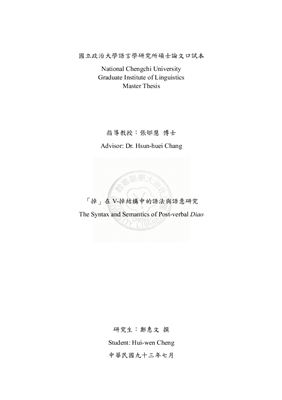Магистерская диссертация.
Государственный университет Чжэнчжи (Тайвань). НИИ лингвистики.
Научный руководитель: док. Чжан Сюньхуэй.
Июль, 2004 год.
Язык: английский.
Формат: PDF-файл, текст.
Количество страниц: 81
Размер файла: 389 KB. Master Thesis.
National Chengchi University. Graduate Institute of Linguistics.
Advisor: Dr. Hsun-huei Chang. Abstract. There are two main questions about post-verbal diao we dealt with in the present study: one is its meanings, and the other is its syntactic status. We argue that when diao acts as a resultative complement, it means ‘to be removed in a downward direction’, when it acts as a phase marker, it means ‘to be removed’, and when it acts as an aspect marker, it bears a grammatical meaning indicating inchoative. Post-verbal diao usually co-occurs with transitive and unaccusative verbs to form compounds. When diao goes with State, Semelfactive and Achievement verbs, the V-diao compounds will be Achievements, when diao goes with Activity and Accomplishment verbs, the V-diao compounds will be Accomplishments. In most cases, the argument structure of a V-diao compound is a composition of the argument structure of the preceding verb and that of diao. However, diao will suppress the Goal argument when co-occurring with three-place transactional verbs; it will create an argument for the V-diao compound when the argument of the preceding verb and that of diao are incompatible; it will suppress an argument of the preceding verb and create a new one for the V-diao compound when occurring with verbs which have an incremental theme. Grammaticalization is taken to account for the polysemy and the multiple syntactic status of post-verbal diao. Because except specialization, diao follows all of the principles (i.e. Layering, Divergence, Persistence, and De-categorialization) proposed by Hopper (1991), we suggest it is in the process of grammaticalization.
Государственный университет Чжэнчжи (Тайвань). НИИ лингвистики.
Научный руководитель: док. Чжан Сюньхуэй.
Июль, 2004 год.
Язык: английский.
Формат: PDF-файл, текст.
Количество страниц: 81
Размер файла: 389 KB. Master Thesis.
National Chengchi University. Graduate Institute of Linguistics.
Advisor: Dr. Hsun-huei Chang. Abstract. There are two main questions about post-verbal diao we dealt with in the present study: one is its meanings, and the other is its syntactic status. We argue that when diao acts as a resultative complement, it means ‘to be removed in a downward direction’, when it acts as a phase marker, it means ‘to be removed’, and when it acts as an aspect marker, it bears a grammatical meaning indicating inchoative. Post-verbal diao usually co-occurs with transitive and unaccusative verbs to form compounds. When diao goes with State, Semelfactive and Achievement verbs, the V-diao compounds will be Achievements, when diao goes with Activity and Accomplishment verbs, the V-diao compounds will be Accomplishments. In most cases, the argument structure of a V-diao compound is a composition of the argument structure of the preceding verb and that of diao. However, diao will suppress the Goal argument when co-occurring with three-place transactional verbs; it will create an argument for the V-diao compound when the argument of the preceding verb and that of diao are incompatible; it will suppress an argument of the preceding verb and create a new one for the V-diao compound when occurring with verbs which have an incremental theme. Grammaticalization is taken to account for the polysemy and the multiple syntactic status of post-verbal diao. Because except specialization, diao follows all of the principles (i.e. Layering, Divergence, Persistence, and De-categorialization) proposed by Hopper (1991), we suggest it is in the process of grammaticalization.

